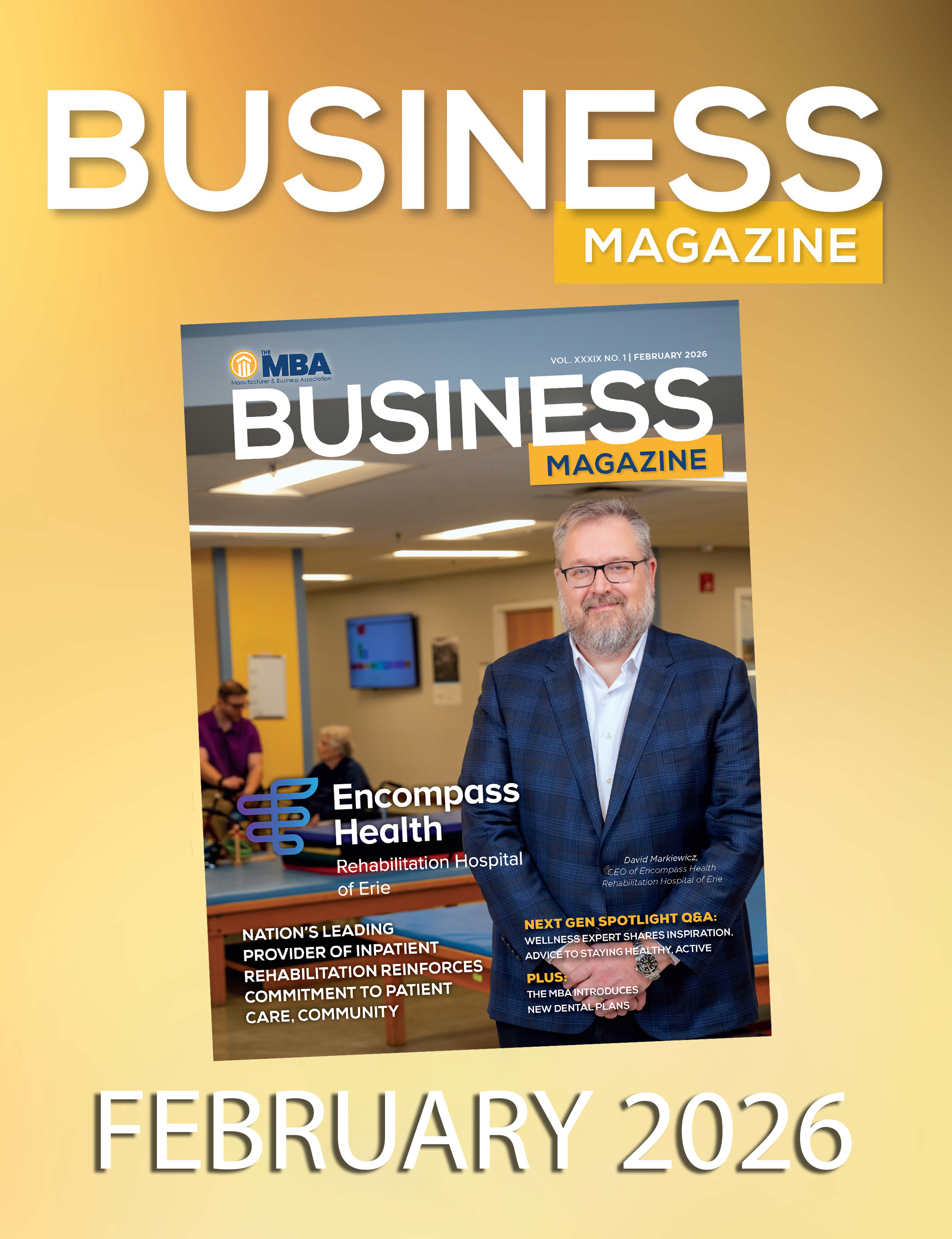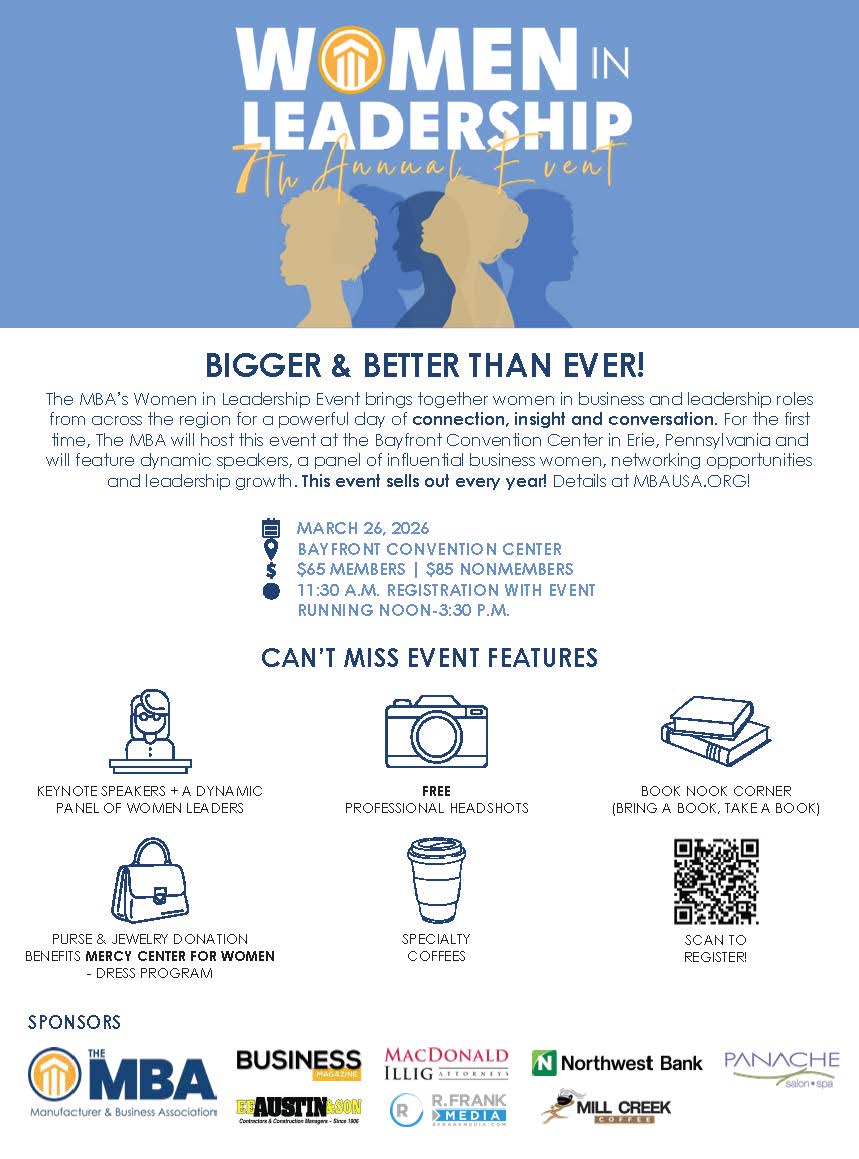As part of its 120th anniversary celebration, The MBA is recognizing leaders of longtime member organizations who have contributed to the regional business community. Thomas B. Hagen has built a remarkable legacy through his leadership in business and his deep commitment to economic development and philanthropy. He is chairman and a former CEO of the Fortune 500 company Erie Insurance Group and is also the chairman of Custom Engineering Co. A retired U.S. Navy Reserve Captain, Hagen also served under Governor Tom Ridge as Pennsylvania Secretary of Commerce and as the first secretary of the Department of Community and Economic Development (DCED).
In addition to these roles, Hagen has helped drive growth by emphasizing the importance of community involvement. In 2024, Hagen received the 125-year-old Pennsylvania Society’s highest honor, the Gold Medal for Distinguished Achievement. He established the Susan Hirt Hagen Center for Transformational Philanthropy at The Erie Community Foundation where he is a former trustee. He also has taken an active role in the revitalization of Erie’s historic neighborhoods and has earned several awards for his restoration efforts, including the Otto Haas Award for outstanding individual achievement from Preservation Pennsylvania and the Pennsylvania Historic Museum Commission. Here, Hagen, who will celebrate his 90th birthday in September, reflects on his career and the importance of giving back.
Throughout your more than 60- year career, you’ve demonstrated exceptional leadership across multiple sectors. How has your approach to leadership shaped the organizations you’ve worked with?
I try to be a servant leader and lead by example. I think those are pretty important things for the leadership at any organization. I’ve been so imbued in working with Erie Insurance that I try to follow their values, which includes the Golden Rule. I think it’s just plain decency and common sense to treat others as you would like to be treated.
You’ve been known to minimize your influence, but what are you most proud of when it comes to business decisions you’ve made that have had lasting impact?
Staying in Erie and contributing to the Erie community. Some years ago, back in the 1980s, when we were about to build our signature building for Erie Insurance, the F.W. Hirt-Perry Square Building, we had an opportunity to move our headquarters closer to the center of our operations — to Pittsburgh or even south of Erie in a more suburban location like so many corporate headquarters have done across the United States. But we made the conscience decision of staying here in downtown Erie, where Erie Insurance has been located since 1925 when it started at 10th and State, and in 1938 moved to Sixth and French. We felt, after a thorough analysis, that was best for us and best for the community where we live.
And Custom Engineering?
I bought the company in 1997. The prior owners had opportunities, and I’ve had opportunities since then, to sell it to other out-of-town firms that wanted to consolidate their expertise in fabrication. But we’ve made a very deliberate decision to stay in Erie and thrive in Erie. The management under Dave Tullio’s leadership has been committed to that as well. I’ve been transferring principal ownership to him, so the company will remain here under an Erie- born-and-bred leader. Our management and our board at Custom are committed to staying in Erie.
What is one of your favorite memories from your professional career and why?
My professional career in a way really started in the U.S. Navy after I graduated from college (after attending Penn State Behrend and graduating from The Ohio State University). I have to say that, as a young naval officer, I had responsibilities for personnel and materiel in my early twenties that I would never get at that age in the private sector. I’ve had similar conversations and agreement with two other former Erie residents and former naval officers about this — Strong Vincent grad Henry Schacht, who was one of the youngest CEOs of Cummins Engine of Columbus, Indiana, and the first CEO of Lucent Technologies, and Craig McClelland, who was the last CEO of Hammermill Paper Co.
Beyond that, it’s the influence of H.O. Hirt because he had an entrepreneurial view of things. He started Erie Insurance in 1925 and ran it for its first 50 years. I had the good fortune to work with him in his last 30 years and learn from him. What I learned is more of an entrepreneurial spirit and a common- sense approach to things — a “Keep it simple, stupid” philosophy.
What is the best leadership advice you ever received?
Again, this starts with the Navy. It’s to take care of your crew — take care of the people who work for you and give credit to others. In my view, no decent leader gets to be a leader and stay a leader unless they give credit to the people who make it possible for them to be a leader. No single person makes everything happen. You need teamwork behind you to accomplish what you want to accomplish.
How has your experience in business influenced your approach to philanthropy? Are there any particular experiences that have shaped your views on giving back?
It’s a total accumulation of life experiences. I’ve been working since I was 9 years old, and I paid my way completely through college. Many of those jobs were pretty common tasks — waiting on tables, operating a refreshment stand push cart at the Public Dock in the summer, painting houses, a paper route — that put me in touch with ordinary people, so I got to know the trials and tribulations of people living from hand to mouth, and some not even being able to do that without some public or private assistance. That really has shaped my approach to philanthropy.
What role do you believe business leaders should play in getting involved and giving back, and what advice would you offer to others seeking to make an impact?
Erie is a really nice place to live, and it’s a good place to raise a family and be able to get around and have many of the amenities of a bigger city without having all of the congestion problems of a bigger city, but we do have problems. We do have poverty issues, particularly with children, that need to be addressed. I would hope that a business leader who has been successful and accumulated some wherewithal will reach out and consider helping make this a better community. There’s always room for improvement.
You are helping preserve and develop some of Erie’s historic neighborhoods along with revitalizing the downtown area. What do these efforts mean to you and the city’s future?
I would hope we all take pride in the place we live and, when we see something that is going wrong or deteriorating, that we will try to do something to improve it, whether it’s through influence, volunteer work or philanthropy.
I’ve always been interested in architecture and history together. For the first few years of my life, I lived on West Sixth Street, and I knew those buildings along the stretch from Peach to Gridley Park very well. To see them in decline, many of them designed by leading regional architects like E.B. Green of Buffalo, Frank Meade of Cleveland and Joseph Frank of Erie, I had the wherewithal and the interest to do something. But there’s a lot of other things that people can do in improving their neighborhood — using some paint where needed, cutting the grass, trimming the bushes. That’s all manual labor, by and large, and doesn’t take a lot of expense to help take pride in their city.
I’m glad to see that work is being done on the old West 12th Street industrial corridor, particularly by the Erie County Redevelopment Authority on the old EMI facility on 12th and Cherry, and by others along 12th Street, because it is an entryway into our city.
Is there anything you’d like to add?
I have developed a family motto of “Semper Serviente” — in Latin meaning “always serving.” Our family has done that over the years, and it’s being carried on, particularly by my daughter, who is a part-time resident of Erie and who is connected to the needs of Erie.
I know there’s skepticism about leadership roles in government and corporations by young people today, but I hope, as they mature, that their outlook will change and they will become more interested in the world around them by taking leadership positions or elected positions in townships, boroughs, school districts, cities and philanthropic organizations that make a difference in our community. Because we can’t just leave everything to the other guy. The other guy has to be all of us, and we all have to take an interest.


















